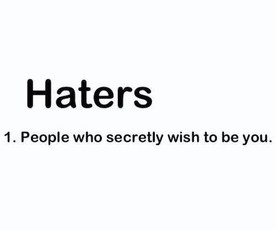
Haters gonna hate, no matter where you go. This is especially true if you have a mental health diagnosis in a straight-edged, rigid world that has yet to embrace neurodiversity in its entirety.
Word got out at my place of work that I have bipolar disorder. Young, twenty-something-year-old Bel lacked the discernment to choose who to trust with my diagnosis; I was too naive, too trusting. I pride myself on my openness and vulnerability, and I truly believe that vulnerability breeds deeper connection—and that’s what most of us really want, to connect authentically with others.
Except not everyone in this world can be trusted. Not everyone is your ally. Not everyone has your best interest at heart. Not everyone deserves the deep conversations. You tell them something personal about yourself, like your mental health diagnosis, and they weaponize that information and use it as fodder for gossip.
The Gossip Machine and “Jennifer”
We’ll call this lady “Jennifer” from Bay Club, the place where I teach fitness classes. Years ago, I had mentioned my bipolar disorder loosely to her in conversation, and she discovered my previous blog where I’d write openly about my diagnosis and recovery journey. She complimented the blog, saying I had a way of making my readers feel what I felt, that I had a knack for language. That alone was enough to earn her my trust.
Fast-forward to 2025. Jennifer, still a regular member at Bay Club, was swimming laps in the kiddie pool when she started talking to my friend, Robbie, and asked him, “Are you friends with Belicia?”
He replied in the affirmative.
“Did you know she’s bipolar?”
Robbie later relayed this conversation to me, and I was understandably taken aback that Jennifer would say such a thing. She turned my vulnerability into a subject for gossip, as if she had some salacious information about me that the world needed to know. She thought of herself as a proprietor of top-secret information and garnered a sense of self-import by being the one to disseminate it. Of course, Robbie already knew about my challenges, and he did not take kindly to her gossip.
“This woman is not your friend,” he warned me.
So this is the kind of woman Jennifer is. Back-stabbing, manipulative, two-faced. No wonder she doesn’t have a single friend at Bay Club and has earned her reputation as one of the most difficult, demanding, entitled members at the club.
“You Especially Would Like Good Food”
About a week ago, I ran into Jennifer in the women’s locker room where I was soaking in the hot tub. I paid her no heed, just acknowledged her presence with a cool “hello” and minded my own business. Inside, I knew what kind of person she was and what she thought about me, but I did not wish to instigate an argument or stoop to her level of pettiness. So I closed my eyes and let the hot water soothe my tired muscles, ignoring her hovering presence.
Her shrill voice pierced through the calm like a laser-beam. She asked me where I was working that day, and I replied that I was teaching a yoga class at Google at 4:30 pm. She asked if I got free food from Google, and I replied in the affirmative, adding that the food was gourmet and delicious, and that I was really lucky to work there.
“You’d really like that, wouldn’t you?” she said with a smirk.
A beat. Whatever could she mean by that back-handed comment? Hiding my confusion behind a polite smile, I replied, “I mean, who wouldn’t like good food?”
“Well, I mean, you especially.”
Body-image issues, triggered. Is she calling me fat? I am not fat, not in the least. I am a fitness teacher and dancer. But what did she mean, “you especially would like good food?” What could she possibly know about me that would lead her to make such an assumption? Why was she being provocative and mean?
Now I was really heated, and it wasn’t because of the hot water. I let my gaze drift away from her eyes and down at the bubbles, and I simply replied, “Okay.”
Saying nothing more, she walked away, leaving me crestfallen. I try to see the good in everyone, even the most nefarious of us, because hurt people hurt others, right? And I knew a bit of her personal story and the challenges she’s endured, so I had compassion for her.
My Self-Soothing Toolkit
In that moment, I instinctively turned to my go-to self-soothing practices. Here’s what I did to recenter:
- Breathe. I always come back to my breath when I feel heated, agitated, or perturbed. I focused on slowing down my heart rate, which was beating a mile a minute.
- Accept my feelings. I was justified to feel hurt by her words. In the past, I’ve struggled with disordered eating and body dysmorphia that stemmed from my ten years in competitive rhythmic gymnastics. To this day, I still have body image issues as a dancer and fitness teacher, and I feel pressure to look slim, athletic, and toned, which is sometimes difficult with the bipolar meds I’m on. I’ve worked long and hard in recovery to embrace my body and accept that I am not a size zero, and that is absolutely okay. But body image remains a touchy subject for me, and I absolutely hate it when people make comments about my body, especially if there is a negative insinuation attached to their words.
- Non-attachment. This is what yoga teaches us. Don’t cling to negative experiences, words, or people—let them wash over and through you.
- Use the pain as fuel. As an artist, you’re a conduit of emotion. Let the pain fuel the creative process. This post is a case in point. I was feeling painful emotions, and that pain is what wrote this post with little effort on my part. Make your mess your message.
Living Your Best Life, Haters Be Damned
All this to say, you can’t please everyone. People will always find something to judge you for, especially if you are crushing it at life and they grow jealous of you and your accomplishments. Some people are just plain wicked and put others down for sport.
Don’t let them get to you. Just ignore the small-minded cretin and live your best life. Choose your tribe wisely, find people who love you and genuinely care about your well-being. Ignore the rest. Rise above, and don’t stoop to the level of your haters by reacting with equal hatred. Kill them with kindness, as they say.
Know when to stand up for yourself, because that is very important (I am still working on that in therapy). But also pick your battles wisely. Choose the hills you wanna die on, and let everything else go.
What are some ways you guys handle the hate? I’d love to hear your tried-and-true strategies in the comments!


Unfortunately, people still stigmatize mental health. I think it’s incredible that you share so honestly because it probably makes other people with bipolar understand themselves better and feel like they are not alone. This lady clearly had the outdated view that something is “wrong” with someone just because they have a diagnosis.
I haven’t experienced outright hatred before, because I don’t have any form of diversity that is easily noticeable just by looking at me (or based on what I post online). However, I’ve experienced discrimination because of my religion before. It had an impact on me professionally. I dealt with the hate by leaving that work environment and switching to a much better one.
Macey,
Thank you for your words. Indeed, I hope people reading can find solace in shared experience. Stigma still runs rampant, and we all have aspects of ourselves, aside from mental health status, that can be subject to outside judgment. I am sorry people have discriminated against you because of your religion, and the ramifications that came of it. It’s great you switched your work environment and found a place that was more accepting.